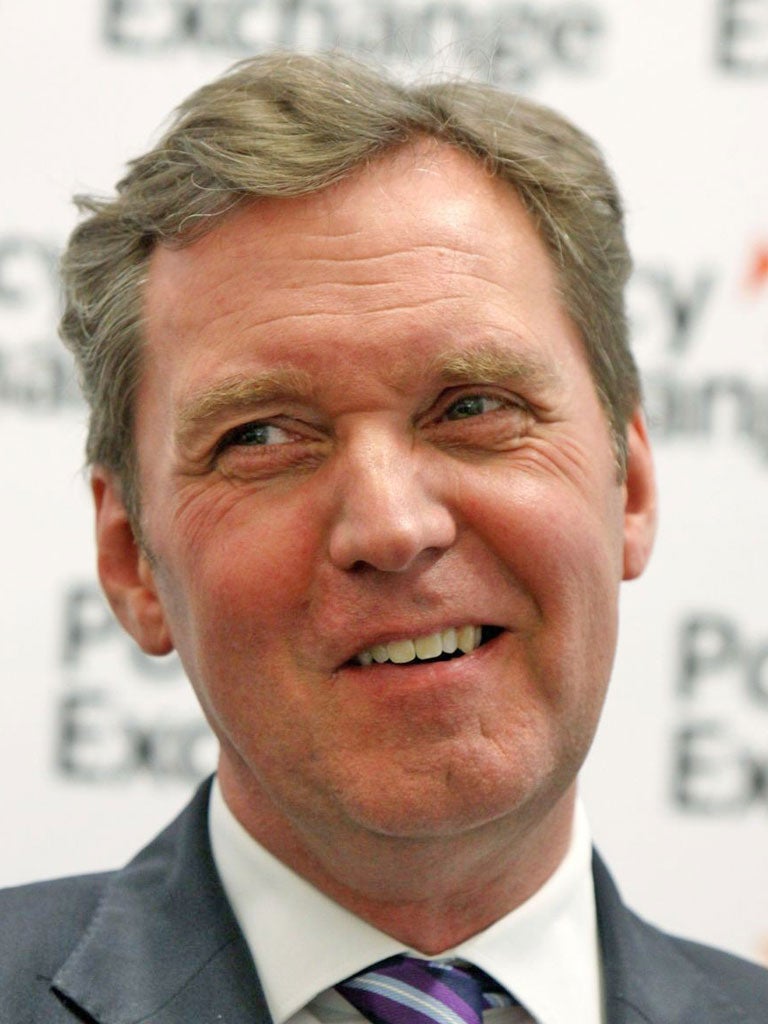Come clean on child poverty failure, Alan Milburn tells Government
Adviser urges Cameron to act as cuts push more children below legally binding threshold

Your support helps us to tell the story
From reproductive rights to climate change to Big Tech, The Independent is on the ground when the story is developing. Whether it's investigating the financials of Elon Musk's pro-Trump PAC or producing our latest documentary, 'The A Word', which shines a light on the American women fighting for reproductive rights, we know how important it is to parse out the facts from the messaging.
At such a critical moment in US history, we need reporters on the ground. Your donation allows us to keep sending journalists to speak to both sides of the story.
The Independent is trusted by Americans across the entire political spectrum. And unlike many other quality news outlets, we choose not to lock Americans out of our reporting and analysis with paywalls. We believe quality journalism should be available to everyone, paid for by those who can afford it.
Your support makes all the difference.The Government's adviser on social mobility has urged ministers to admit they will miss a legally binding target to cut child poverty because of spending cuts and the flatlining economy.
Alan Milburn warned that the Coalition's austerity measures would deepen child poverty rather than reduce it to meet the goals set by the previous Labour Government. The Coalition has signed up to Labour's target to cut the proportion of children living in absolute and relative poverty to 5 and 10 per cent respectively.
The former Labour Health Secretary, now the independent reviewer of social mobility and child poverty, said: "No one believes it will be met. It is up to the Government to come clean on this, put its hands up and say it is not going to happen."
Mr Milburn echoed forecasts by the Institute for Fiscal Studies think-tank that the number of children in absolute poverty will rise by 500,000 to three million in 2015 and that 3.3 million children– almost one in four – will be in relative poverty by 2020. He said: "A combination of the sluggish economy and public spending cuts will take their toll. At a time of austerity there is a risk of a negative social impact."
He urged David Cameron to take personal charge of the Government's drive to improve the life chances of the most disadvantaged. He said Mr Cameron, despite his privileged background, could fight back after last week's poor local election results by championing social mobility.
"People who have been fortunate in their lives, if they have an opportunity to exercise power, one of their core purposes should be to try to make sure that others get the same benefits they enjoyed," said Mr Milburn. "It would be good for the Prime Minister to stamp his mark on this agenda. The difficulties the Government has encountered in recent weeks – in particular being seen as out of touch – provides an incentive, both politically and ethically."
So far, Nick Clegg has led the Government's drive on social mobility. But Mr Milburn warned too many Cabinet cooks have fingers in the same pie, including Welfare Secretary Iain Duncan Smith, Education Secretary Michael Gove and Chief Treasury Secretary Danny Alexander. "The Government's intentions are good. But I think there is a danger of trying to do too much and ending up achieving too little."
The former Cabinet minister said the Coalition should consider further cuts in child benefit for better-off families so state money could be switched to affordable, universal child care – one of the best ways to improve social mobility and cut child poverty.
Although Britain spends more than the OECD countries' average on families, a higher proportion goes on cash payments like child benefit, while Scandinavian nations devote more money to service provision like child care and enjoy better mobility and poverty figures.
Mr Miliband backs the Coalition's £2.5bn "pupil premium" for schools but will investigate if all the money is reaching disadvantaged children as intended. He suggested Mr Gove is reluctant for his department to monitor every school.
His next report will be on the "who you know culture" in the professions, which he believes is a huge barrier to social mobility. He has been looking at the law, medicine and media. "There is still as very long way to go. My overall sense is that progress is very patchy," he said.
How poor is poor?: 'child poverty'
A child is defined as being in "relative poverty" if he or she lives in a household whose income is below 60 per cent of the average in that year.
They are in "absolute poverty" if they live in a household whose real-terms income is below 60 per cent of the 2010-11 average – the benchmark set in the Child Poverty Act passed by Labour in 2010.
According to the Institute of Fiscal Studies, the proportion of children living in absolute and relative child poverty in 2020-21 is forecast to be 23 and 24 per cent respectively, compared to targets of less than 5 and 10 per cent set out in the Act.
Join our commenting forum
Join thought-provoking conversations, follow other Independent readers and see their replies
0Comments